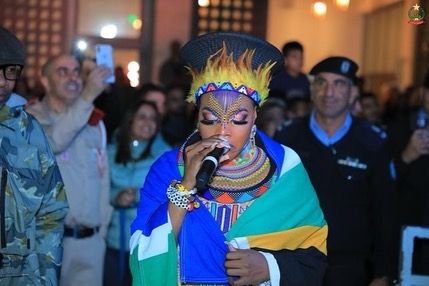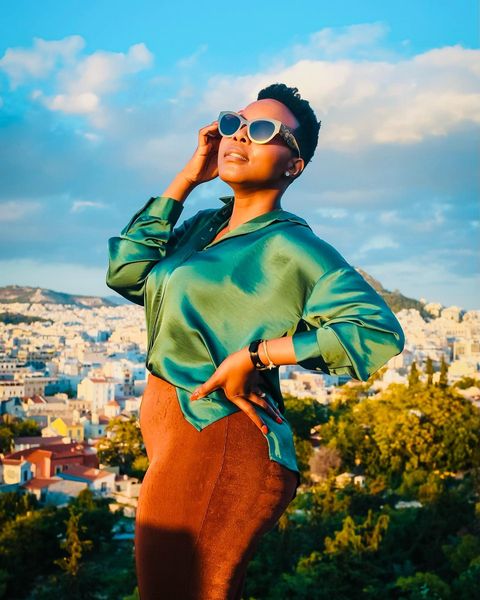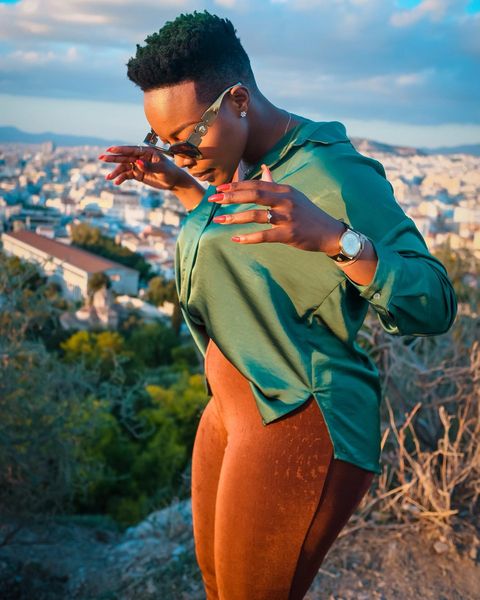She should be celebrating. She’s got another hit that’s made global impact, so much so that’s it’s been nominated for a Grammy Award.
But Nomcebo Zikode is getting ready for a fight over the ownership of music.









South Africans from all corners of the country celebrated the announcement of the Grammy nomination for the chart-topping Bayethe, which is a collaboration between Nomcebo, Zakes Bantwini and past Grammy winner, Wouter Kellerman.
But in a dramatic turn of events, Nomcebo has headed to the Pretoria High Court after her record label, Open Mic Productions wrote to Spotify, asking them to remove the song from their charts, citing intellectual property infringements.
In her founding affidavit, which Drum is in possession of, Nomcebo says she is the co-author of the song with Zakes and Wouter. She says they recorded it in various parts until it was released to South Africa and rest of the world on 30 September 2022.
The Grammy nomination announcement was made on 16 November 2022, with the awards set to take place on 6 February 2023 in Los Angeles.
“The statement is false, and the respondent knows it to be so. It holds no copy rights, or any other intellectual property rights, in the song or the recording. It is also not entitled to attempt to prevent me from making recordings or performing,” says Nomcebo in part of her papers.
She says the take down notice to Spotify may affect her Grammy nomination.
Read more | Nomcebo Zikode beside herself with excitement after learning of her and Zakes Bantwini’s Grammy nom
Since she entered into an agreement with Open Mic Productions on 10 September 2018, she claims she has never received any royalty payments for any of her songs.
Since the contract was entered into, she released songs like Imizamo Yami on 29 March 2019 and Xola Moya Wam on 21 August 2020.
“Notwithstanding the respondents obligations in terms of the agreement to pay for the making of these recordings, it did not do so. I in fact covered these costs. By 2020 the relationship between me and the respondent had soured. It made little, if any, effort to advance my career in fact actively stymied my career.
“As an example of this conduct, the respondent would not agree to me performing on a Bob Marley tribute album produced by Island Records, and it sought to prevent me from performing Jerusalema at the Africa Cup of Nations final on 8 February 2022.”
In 2019, she says, she was part of the recording of the global phenomenon Jerusalema, which kept the world entertained during hard Covid 19 lockdowns. She says Open Mic Productions was not involved in any part of the process of recording that track.
“The respondent has been exploiting the Jerusalema recording since November 2019. Notwithstanding the respondent’s obligations to account for revenues earned and pay me all amounts that are payable in terms of the agreement, the respondent has not paid me any royalties – not a cent – in relation to the exploitation of the above recordings.”
She has taken that matter of royalties for Jerusalema to court, against Open Mic and Master KG.
At best, she says she received a statement on 10 August from Open Mic reflecting the revenue from her songs. It was R224.20 for Imizamo Yami and R2069.155 (sic) for Jerusalema. She alleges she has never received any statements regarding Xola Moya Wam.
Music legend Oskido is said to have tried to help the parties reach an agreement through mediation, but that failed.
In Part A of her application, Nomcebo is now asking the court to, on an urgent basis, interdict Open Mic from saying it owns, controls or has copyrights to the song Bayethe or the recording.
“To interdict (Open Mic) from stating that I am not permitted to record or perform any music without it’s permission.”
She is also asking the court the instruct Open Mic to ask Spotify to reinstate the track on their charts.
In Part B, she is asking the court for an order that declares her agreement with Open Mic was terminated in 2021.
Nkateko Maluleke, a director at Open Mic Productions, deposed to an answering affidavit, which Drum has a copy of, where he says they are opposing Nomcebo’s application.
Before even going into the merits of her case, Nkateko says Nomcebo has no legal basis of bringing the matter to court because Bayethe was licensed to Universal Music and since Nomcebo is not claiming she is bringing the matter court on Universal’s behalf, she has no right to bring the matter to court.
“On the facts, it is clear that the urgency is self-created,” Nkateko says.
“The applicants have failed to establish a causal link between the take down notice to Spotify and how that apparently affects her Grammy nomination. The Grammy nomination is not threatened at all.”
He says her Xola Moya Wam album does not meet the requirement of being between 45minutes to 65 minutes long.
“She failed to comply with this contractual requirement. The album released, Xola Moya Wam, is below the minimum 45 minutes requirement.
“Open Mic undertook to pay the costs of all recordings, thus at best the applicant may have a reimbursement claim against Open Mic, and there is a clear prohibition that the artist is not entitled to record for any other party.
Read more | The Master KG, Charmza the DJ and Nomcebo legal battle over Jerusalema continues
“All recordings made during the lifetime of the Recording Artist Agreement remain property of Open Mic. Open Mic has exclusive and perpetual ownership of all recordings, including the right to license, use and publish same. Open Mic has the right to exploit (Nomcebo’s) name and image, as it wishes.
“I deny that (Nomcebo) owns a copyright to Bayethe. I note that Wouter Kellerman and Zakes Bantwini are feature artists to the song Bayethe. Accordingly, they would not possess any stronger right to the song than (Nomcebo). Quite the opposite, theirs would be subservient. Universal’s silence also cannot be ignored.”
He adds that Spotify removing the song on the day of the Grammy nomination is “purely coincidental”.
According to Nkateko, “it is incorrect that Open Mic in not entitled to prevent Nomcebo from recording or performing.”
“I admit there is an ongoing dispute regarding the world-acclaimed Jerusalema. Nomcebo was a featured artist in Jerusalema and worked with Open Mic’s artist, Master KG.”
He says Nomcebo and Master KG negotiated among themselves to share the royalties 50:50 and at the time, no one knew that the song would reach global success.
“Once the song became a global success, Nomcebo sought to deny that she was a featured artist and the agreement to share royalties 50:50 with Master KG. Instead, she demanded a host of things, including half the revenue generated by the song. This demand runs contrary to her contract with Open Mic.”
Nkateko say Nomcebo has “gone rogue” and has done work locally and internationally to the exclusion of Open Mic and as such, has been paid millions of rands.